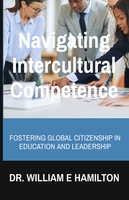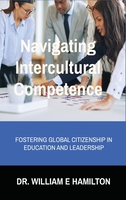About the author
Dr. William E. Hamilton, Jr. holds a Ph.D. in Organizational Development and Leadership with a specialization in Training and eLearning. A retired U.S. Navy Lieutenant Commander, he is a Certified Professional in Talent Development (CPTD), an Intercultural Development Inventory® (IDI) Qualified Assessor, and a former lecturer at the Malaysian Maritime Academy, where he delivered thousands of hours of training in safety, survival, and firefighting. He has published extensively in GlobalMET and presented globally on adult learning, virtual education, and intercultural leadership.

About the books
These two books offer a powerful roadmap for educators, business leaders, and DEIB professionals who are committed to fostering global citizenship, inclusive leadership, and high-impact collaboration.
📘 Navigating Intercultural Competence: Fostering Global Citizenship in Education and Leadership (2025) This volume offers a real-world, strategic guide for educators, DEIB leaders, and training professionals. Anchored in Bloom’s Taxonomy and two original intercultural competence frameworks, it shows how to design measurable, transformative learning that aligns with organizational goals and turns awareness into action. A must-read for those leading in education, government, and nonprofit sectors.
📗 The Global Mindset: A Roadmap to Intercultural Competence in Business (2024) Written for diversity officers, HR professionals, and global managers, this book provides essential tools for building inclusive teams, navigating cross-cultural challenges, and using cultural diversity as a competitive edge. With actionable strategies and business-aligned insights, it’s designed to help organizations unlock the full potential of a diverse workforce.
Together, these books form a unified call to action: develop a global mindset, lead with strategic intent, and embed intercultural competence into the DNA of your organization.

Navigating Intercultural Competence books series
A Professional Series on Global Readiness and Inclusive Practice
In an age of cultural complexity and global interdependence, intercultural competence is essential—not only as a personal asset but as a strategic imperative across education, leadership, and policy. The Navigating Intercultural Competence series offers a three-volume professional roadmap for those seeking to build inclusive, agile, and globally responsive systems.
Grounded in Bloom’s Taxonomy and enriched by original strategic frameworks, this series equips educators, DEIB leaders, organizational trainers, and institutional change-makers with the insight and tools to integrate intercultural competence into everyday practice—across classrooms, boardrooms, and campuses.
Book Launch Recording – Full Video (58 min)
Volume I: Navigating Intercultural Competence — Fostering Global Citizenship in Education and Leadership
An essential starting point, this volume introduces conceptual foundations, instructional models, and pedagogical strategies to develop intercultural competence. It scaffolds learning from basic to advanced levels using Bloom-aligned objectives and helps professionals frame global citizenship as a core leadership and learning outcome.
Volume II: A Guide to Culturally Smart Business — Strategic Alignment and Impact through Intercultural Capability
Targeted toward business leaders, HR strategists, and DEIB practitioners, this volume builds on foundational concepts to deliver organizational-level strategy. It introduces the Intercultural Strategy Framework (ISF) and practical tools for evaluating and aligning DEIB, leadership development, and innovation in globally dynamic business environments.
Volume III: Intercultural Competence in Higher Education — Aligning Curriculum, Leadership, and Global Citizenship
This capstone volume addresses the institutional dimension. Designed for academic leaders and curriculum designers, it offers frameworks, rubrics, and strategic guidance for integrating IC into curricula, faculty development, and global learning initiatives. It connects intercultural competence with workforce readiness and systemic transformation.
Note on Prior Work
Dr. Hamilton’s earlier book, The Global Mindset: A Roadmap to Intercultural Competence in Business, laid the groundwork for understanding IC in the business world and remains a valuable companion for those interested in cross-cultural leadership. However, the Navigating Intercultural Competence series expands the scope to a fully integrated, three-sector strategy: education, business, and higher education systems.

Latest Books by Dr. Hamilton
Hardcover $39.99 – Amazon
Paperback $14.99 -Amazon
Kindle EPUB $9.99 – Amazon

This guide offers actionable strategies for educators, policymakers, and leaders to foster global citizenship and navigate cultural challenges.
Structured around foundational and advanced models, Dr. Hamilton draws from his Navy and leadership experience to illustrate how IC fosters empathy and progress.

This edition provides a hardcover format of the same impactful frameworks that help leaders and educators translate IC into meaningful action.
Perfect for academic, professional, or personal libraries, it complements ongoing global citizenship and DEIB efforts with clarity and purpose.
